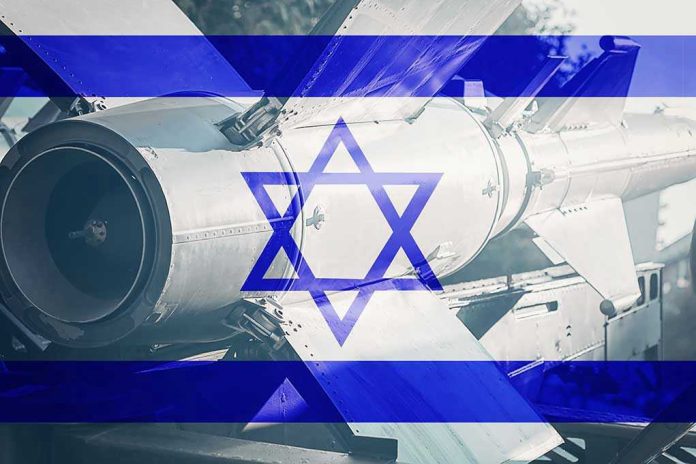
The use of cluster bombs by Iran-backed Houthis against Israel signals an alarming new escalation, raising urgent questions about regional security and the erosion of humanitarian norms.
Story Snapshot
- Houthis launch cluster bomb attack on Israel, marking the first use of such munitions in the conflict
- Israel responds with intensified air and naval strikes on Houthi targets in Yemen
- Conflict highlights deepening Iran-Israel proxy war and exposes failures of international deterrence
- Escalation threatens civilian safety, disrupts global shipping, and undermines humanitarian law
Cluster Bomb Attack Signals Dangerous Escalation
On May 4, 2025, a ballistic missile fired by Yemen’s Houthi rebels landed near Israel’s Ben Gurion Airport, with subsequent reports confirming the first documented use of cluster munitions against Israeli territory. The Houthis, long designated as a terrorist organization by both Israel and the United States, have ramped up attacks in the wake of Israel’s ongoing war in Gaza. The introduction of cluster bombs—a weapon banned under international conventions for their indiscriminate impact on civilians—marks a chilling escalation and underscores the increasing lawlessness fostered by hostile regimes empowered under previous globalist policies.
Israel’s swift response was both decisive and necessary. On May 5, the Israel Defense Forces (IDF) launched airstrikes on critical Houthi infrastructure, including the Sanaa International Airport, targeting both military assets and logistical bases used to facilitate attacks. In June, the Israeli Navy joined the campaign, signaling the nation’s resolve to counter threats not only through airpower but by securing Red Sea maritime corridors increasingly targeted by Houthi drones and missiles. This escalation comes after years of failed appeasement and diplomatic ambiguity that allowed Iran’s proxies to amass advanced weaponry, directly endangering Israeli civilians and global commerce.
Iran’s Proxy Strategy and Regional Destabilization
The Houthis’ aggression is not an isolated phenomenon. It is a clear extension of Iran’s broader strategy to destabilize the region and pressure Israel by operating through armed proxies. Since the collapse of the Israel-Gaza ceasefire in March 2025, the Houthis have dramatically intensified attacks, emboldened by material and strategic support from Tehran. Their actions have included not only missile and drone barrages but also symbolic gestures like the December 2024 blockade of Israel’s Haifa port and ongoing threats against international shipping in the Red Sea. These developments reflect the dangerous consequences of unchecked Iranian influence and the pressing need for American leadership that prioritizes strong alliances and robust deterrence.
Despite a U.S.-brokered ceasefire in May 2025 that stabilized Red Sea shipping lanes, the Houthis continue to target Israel, underscoring the limitations of narrow, transactional diplomacy that fails to address root causes or support allies facing existential threats. The conflict exposes the critical importance of security-first policies and the dangers of globalist reluctance to confront state sponsors of terrorism head-on.
Civilian Impact, Humanitarian Risks, and Erosion of Norms
The immediate consequences of the renewed conflict are severe. Civilians in both Israel and Yemen face heightened risks: Israeli communities near targeted areas endure missile alerts and threats to vital infrastructure, while Yemeni populations suffer under retaliatory strikes that damage essential services and fuel a deepening humanitarian crisis. The use of cluster munitions by the Houthis—a deliberate violation of international humanitarian law—sets a chilling precedent, challenging global norms and raising the specter of further atrocities if unchecked. Aviation and maritime sectors, already battered by pandemic-era disruptions and inflation, now face additional security risks, with flights rerouted and shipping lanes jeopardized.
These mounting threats highlight the consequences of years of lax border enforcement, diplomatic double standards, and the prioritization of international image over concrete action. For American conservatives, the lessons are clear: national security requires steadfast resolve, not accommodation; humanitarian principles demand confronting—not enabling—terrorist actors and their state sponsors.
Expert Analysis: Broader Implications for U.S. and Allies
Leading analysts warn that the unchecked escalation between Israel and the Houthis could spiral into a broader regional war, dragging in neighboring states and endangering global economic stability. Brookings and ACLED note that if ceasefire parameters are breached, the fallout could be catastrophic, with the Red Sea corridor—vital for international trade—at risk of becoming a battleground. The situation also exposes the failure of international institutions to deter flagrant violations of humanitarian law, particularly when those violations are committed by actors shielded by powerful state sponsors like Iran. For the U.S., the crisis underscores the urgent need to restore credibility, strengthen borders, and support allies confronting existential threats from terror proxies.
In this volatile environment, the defense of national sovereignty, the rejection of appeasement, and the upholding of traditional values—such as the sanctity of civilian life and the rule of law—are more vital than ever. As Israel takes necessary action to defend its citizens, Americans should remain vigilant, demand accountability from policymakers, and recognize the high cost of policies that erode deterrence and embolden our adversaries.
Sources:
Israeli attacks on Yemen (May 2025–present) – Wikipedia
The road to the Israel-Iran war? – Brookings
Middle East Overview – June 2025 | ACLED
Israel-Iran conflict | Britannica
Timeline: Houthi Attacks | Wilson Center



